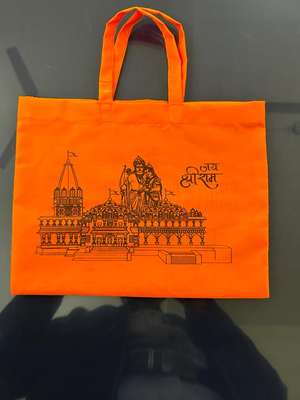Lucknow: Around one lakh inmates from 75 jails across Uttar Pradesh are creating handicrafts, related to Ram temple, to be displayed near the temple, at the airport, bus stations, and tourist spots.
Director General of Prisons Satya Narayan Sabat, said, “Recently, a striking 8 ft x 5 ft wall carpet featuring a Ram temple design, crafted in Bhadohi jail, was presented to the Ayodhya commissioner by DIG (prisons) based in Prayagraj, for its display at a significant location in Ayodhya.”
Sabat said, in Mainpuri district jail, inmates have crafted a Tarkashi art piece depicting the Ram temple and Ram Darbar. Tarkashi is a famous inlaying technique using brass, copper, or silver wires in wood.
Saharanpur jail has produced wooden models of Ram temples, while Fatehpur jail inmates have contributed eco-friendly ‘Ramnami’ cloth bags for distributing prasad on January 22.
The Fatehgarh district jail inmates have crafted exquisite woollen shawls featuring block-printed designs of the Ram temple and ‘Jai Shri Ram’ patterned on them.
In Pilibhit district jail, four skilled inmates, who are professional potters, are creating over 1,000 earthen lamps for illumination, both inside and outside the jail campus on the Pran Pratishtha day, said jail superintendent, Rajesh Kumar Pandey, adding that 673 women inmates will chant the ‘Sundarkand,’ the fifth chapter of Ramcharitmanas.
Meanwhile, apart from jail inmates, Muslims artisans — Hina Parveen, 52; Shamshad Ahmad, 60; and Arman Nabi, 30 — have made a 21.5-foot-long flute, claimed to be the ‘longest playable flute in the world’.
The flute took ten days to make and will be kept in the museum of Ram temple in Ayodhya for public viewing soon.
Crafted from bamboo brought from Assam, the flute has the two deities — Lord Ram and Lord Krishna embroidered on it.
VHP’s Uttar Pradesh head, Harish Rautela, said the flute would be transported to Ayodhya from Pilibhit on a trailer truck on January 26. It will be handed over to the Shri Ram Janmabhoomi Teerth Kshetra, he said.
The three artisans are part of a local flute company that has been involved in making the instrument for nearly 125 years in Pilibhit.
“Pilibhit is well-known for its flute-making industry. We have been careful and tried to ensure the accuracy of the musical notes and pitch. We did not try playing it keeping in mind its religious significance,” said Parveen.
Ahmad added, “People from other states have sent their special offerings, so this is our contribution from Pilibhit for Ayodhya.”
–IANS


Comments are closed.